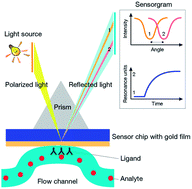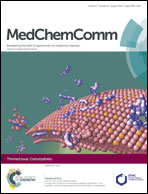Surface plasmon resonance for the characterization of bacterial polysaccharide antigens: a review
Abstract
Carbohydrates, in the form of oligosaccharides, polysaccharides and lipopolysaccharides, are ubiquitous components of the cell surface of bacteria. In the last 30 years polysaccharide-based vaccines have proven to be highly safe and efficacious against bacterial infections like meningitis and pneumonia. Surface plasmon resonance (SPR) analysers have emerged as powerful tools for the characterization of label-free biomolecular interactions, enabling the dynamics of complex formation and dissociation to be monitored in real-time. A wide variety of sensor chips are currently available for many applications. Nevertheless, biosensors with nucleophilic functionalities, such as amino groups, could be useful to extend the SPR applicability. Using selected examples, this review gives an overview of significant applications of conventional flow SPR to investigate the specific interactions of bacterial polysaccharide antigens. SPR has made significant progress in the last two decades and is now becoming a relevant technology for developing immunological assays for in-depth characterization of carbohydrate antigens.


 Please wait while we load your content...
Please wait while we load your content...